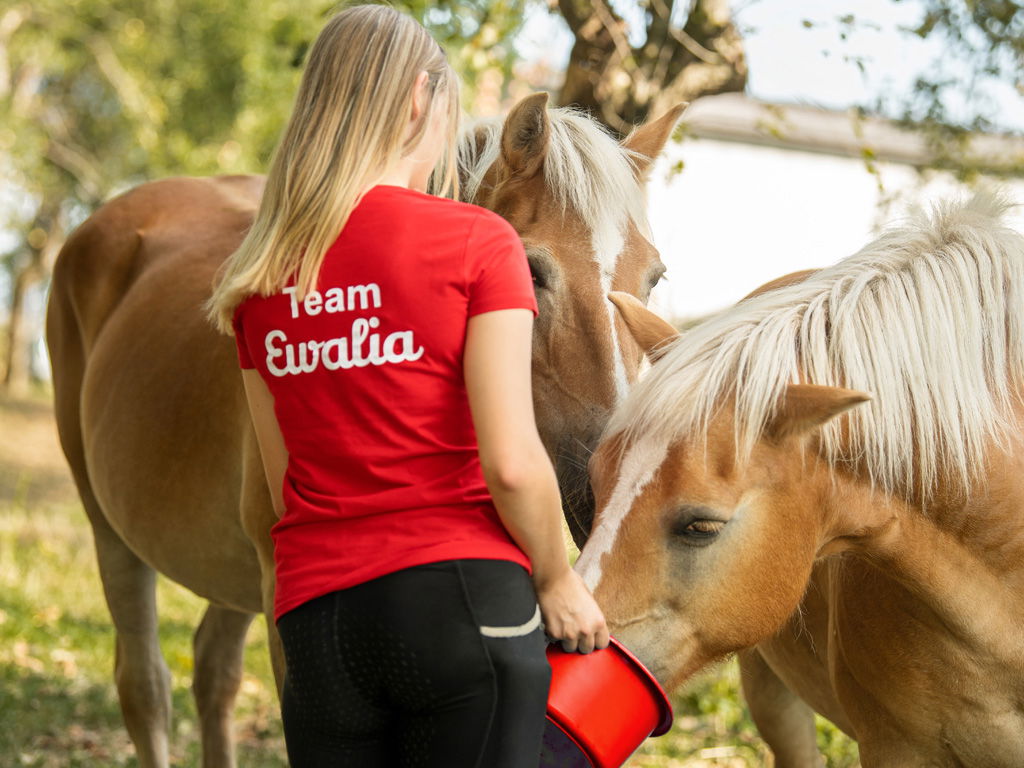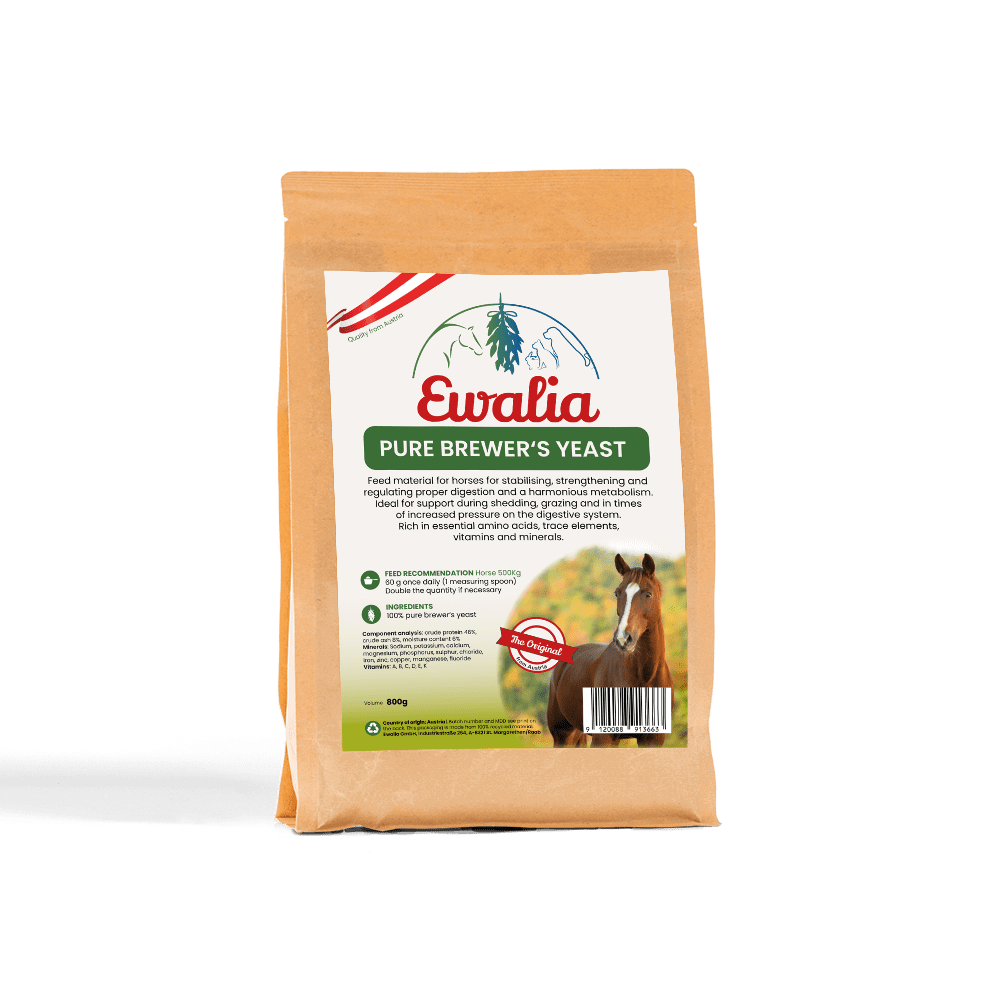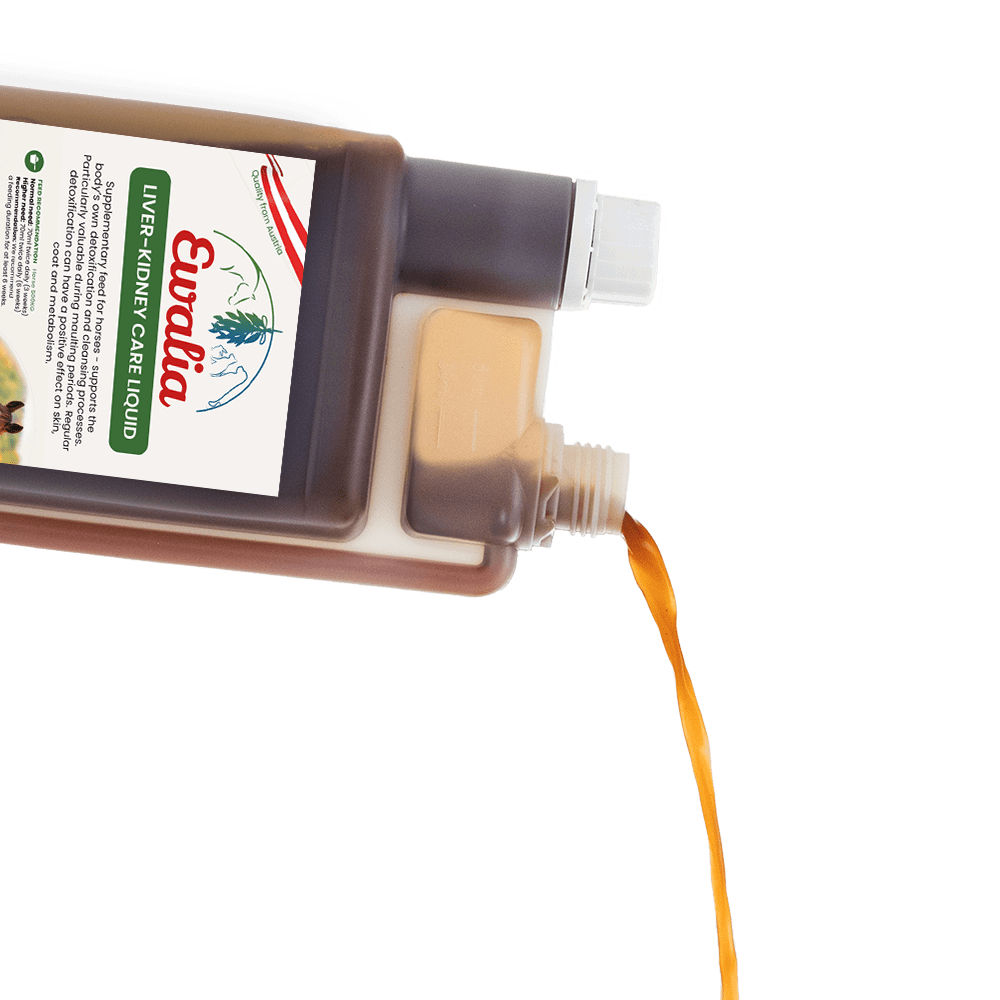Equine gut flora: myths about gut cleansing

"Have you given your horse a gut cleanse?" Horse owners may encounter this question once or twice a year. Gut health is not only known to ensure good digestion as well as good nutrient intake and utilisation, it's also vital for a well-functioning immune system. But how can I best support my horse's gut, what is a gut cleanse and what does it do for gut flora? Here you'll find an overview on gut cleansing and how you can help to build up your horse's gut flora.
Equine gut flora
Gut flora, also known as gut microbiota or the gut microbiome, is defined as the whole environment of microorganisms in the animal's intestine, which is of more or less crucial importance for the animal. Basically, it is not, strictly speaking, "flora", as bacteria form a class of their own and do not belong to plants. It may be described as a micro-community in the horse's gut which processes nutrients, converts, produces vitamins, breaks down nutrients, transports away; in short, they digest.
There is no one ideal gut microbiome
Little research has been done on these micro-communities, however. What can be basically said is that there is no one ideal gut microbiome or a "right" settlement of bacteria in the gut. Every horse has its own micro-community. The presence and amount of microbiota and where they are found in the intestine will not be the same for every horse, or even for those that live in the same barn and eat the same hay.
The inhabitants of a horse's gut include bacteria, fungi (yeast) and protozoa (parasites) with specific duties. For example, streptococci (bacteria) are mainly responsible for fermentation in the gut. They form volatile fatty acids from the sugar compounds in the chyme, which the horse needs as energy for the body. Yeasts (fungi) produce active vitamins in the gut.
A healthy gut = balance and harmony
A healthy gut regulates its population on its own. The inhabitants live in a symbiosis, in balance and harmony. Each intestinal loop has its own composition of microorganisms and its own pH value. This means that the "neighbourhoods" of these microorganisms can change dramatically even just centimetres from one another.
Such changes to gut microbiota can happen very quickly, and depend on the pH value, the supply of nutrients, the condition or health of the organs, the inhabitants present, and much more. A horse's lactobacilli (bacteria for fermentation) transform existing sugar into nutrients. Depending on whether few or many sugar compounds are present, the population of lactobacilli may increase, thus lowering the pH value in this segment of the gut. Other inhabitants cannot survive in acidic environments and will die off suddenly, changing the composition of the colony considerably within a few hours.
The intestinal system is complex, delicate and important for the horse's organism. An antibiotic will interfere with the balance of the microorganisms. Of course in many cases this is necessary and unavoidable! However, animal owners should be aware that this has a strong effect on the animal's entire digestive system. For this reason, great care must be taken to use a high-quality feed that's low in sugar and starch during the regeneration period.
When should I take steps to influence my horse's gut flora?
Here a horse owner should first ask themself: why do I want to do this and why is the intestine not functioning as it should, i.e., how did I recognise that something needed to be done?
After a course of antibiotics, a horse with healthy organs will recover relatively quickly and won't need to be given bacterial cultures. Intervention in the gut flora could also have negative consequences, especially if its status is not known.
Persistent watery stool for more than 6 weeks naturally requires more attention and examination into the cause. Read more about this topic here ->
Diarrhoea, colic, bloating or excessive flatulence and other symptoms should be checked by a vet beforehand and may stem from a variety of causes, including stomach ulcers (Link Magentext). Direct intervention in the gut flora should be the last resort and should not be carried out too quickly.
If your horse's organs are healthy, the gut microbiome will bring itself back into balance. Digestive problems may arise when your horse is transitioned to spring pasture or back to feed, but these do not always require immediate treatment. The symbiosis in the intestine regulates the process of colonisation on its own, and just takes some time. You can support your horse making a slower transition to grazing or feed. This allows microorganisms to adapt "slowly" to the change in available nutrients and populations will not change drastically (explosively) or in large numbers.
Summary: In the case of pronounced digestive problems like excessive flatulence, frequent colic, stool that is hard, too soft, slimy, persistently watery or unusually odorous, the health of the horse should be clarified by a vet on site. If the cause cannot be clearly determined, there are different laboratory diagnostic processes to determine your horse's current health. Blood work, urine samples and especially stool samples will shed light on the problem and determine the further course of action.
How can I improve my horse's gut flora?
Unfortunately, it's not (yet) possible to make an exact diagnosis on the gut flora of a living horse. Laboratory diagnostics can currently help in the following ways:
Measuring pH values:
Every animal owner can carry out this simple measurement and document the results over several days. It involves measuring both stool water and faeces. An analysis by an expert (vet or laboratory) may determine acidosis.
Microbiology tests:
Several samples of stool and stool water taken over a period of 3-5 days can be sent to a laboratory for microbiology testing. This determines the microorganisms present in the aerobic (with oxygen) and anaerobic (without oxygen) environments. Here, a good diagnosis can be made based on the amount or presence/absence of specific microbes. An expert on site carries out the analysis of the microorganisms in connection with feeding and stable management conditions, and can carry out further measures to get to the bottom of the cause. However, the microorganisms in a stool sample are not meaningful on their own, as they are only a "snapshot" of the last intestinal segment and must always be viewed in context of the overall situation.
Faecal parasite screening:
Since endoparasites (i.e., parasites living inside the horse, such as roundworms, tapeworms and trematodes) often contribute to serious digestive problems and organ dysfunction, laboratory testing is recommended if there have been gaps in deworming measures or if infestations have been detected in other animals from the same herd.
If the status of the gut flora is combined with available blood or urine analyses, the causes can be better assessed and treated accordingly, especially those of an organic nature. In the area of the liver and kidneys, especially, it is first necessary to bring the metabolism back into balance before trying to manage the gut flora.
What can a gut cleanse do?
Whether a gut cleanse is necessary at all should in any case be determined by thorough diagnostics to determine the right treatment. Beforehand, organ activity and function should be checked for disorders such as liver, kidney or pancreas inflammations and these should be addressed. The gut microbiome will find balance again on its own in most cases, although this can take several weeks. Metabolism-promoting herbs like stinging nettle or dandelion can bring positive effects in this case. If gastritis, a gastric ulcer or an intestinal inflammation is suspected, it is essential that one look for the cause.
Gut cleanses for deficiencies
Deficiencies due to insufficient nutrient intake or improper feeding can be treated with yeasts. Brewer's yeast is the classic remedy for this. Regardless of whether it's active or inactive, brewer's yeast can lead to pronounced excess gas. It is therefore recommended that brewer's yeast only be used in small quantities and not long-term. For a 500kg horse, a feed quantity of 60g per day should not be exceeded.
Gut cleanses for inflammations
Herbs with anti-inflammatory and mucolytic properties can be used to treat mild intestinal inflammation if the use of stronger prescription medication is not yet necessary. These include herbs such as marsh-mallow or peppermint, which horses also enjoy eating in herbal extract form.
Gut cleanses for acidosis
An adjustment to the feed is important for cases of acidosis. Avoid feeds containing starch an sugar, except for roughage. In addition, acidosis calls for an immediate stop in the feeding of hay and silage. Roughage should be of the highest quality and free from moulds, otherwise it will hardly be of help to the gut flora. Ideally, the status of the intestinal flora has been determined in advance and the vet has prepared an individual feed plan.
Gut cleanse – Constipation
A horse with constipation can be helped with plants that contain tannins. These increase gut activity and help in the further transport of chyme, and include oak bark, raspberry and blackberry. Oak bark, for example, has some anti-inflammatory effects. Tannin-containing plants should not be administered for longer than 4 weeks and should never be given to pregnant mares!
No-gos and warnings with gut cleanses:
- DON'T feed your horse effective microorganisms (EM)! These are too aggressive for the present microorganisms and may lead to a severe imbalance in the gut microbiome!
- Do not use baker's yeast or yeast cubes! These frequently cause faulty fermentation in the horse's intestine and worsen the situation.
- Use caution with mineral clays like bentonite, montmorillonite or zeolite. These bind themselves to all fluids, from saliva to gastric acid and bile. They are good for preventing watery stool, but if the intestine is constipated these mineral clays will "weigh down" the intestine and make it even more sluggish. It could lead to obstruction or, worst case, impaction colic. Mineral clays are not intended for long-term use.
- A horse should not be given additional yeasts (including brewer's yeast) if it is suffering from severe gas and bloating, as these will only make the problem with fermentation worse, in most cases.
- DON'T feed the horse yogurts, other probiotic products like Bifidus, or any similar human foods!! Horses cannot digest these! Horses cannot digest lactose, and the composition of microorganisms in yogurt is entirely different from what the equine gut can digest.
Author: Bianca Becker-Slovacek, 29-01-2019
Further reading
- Baumeister, C. (2018). Labordiagnostik in der Tierarztpraxis. Berlin: lehmanns media.
- Gäbel, G., & Loeffler, K. (2018). Anatomie und Physiologie der Haustiere. Stuttgart: utb.
- Gerber, V., Venner, M., & Straub, R. (2016). Pferdekrankheiten: Innere Medizin (2. Auflage Ausg.). (V. Gerber, & R. Straub, Hrsg.) Bern: utb.
- Krist, S., Buchbauer, G., & Klausberger, C. (2008). Lexikon der pflanzlichen Fette und Öle. Wien: Springer Verlag.
- Röhm, C. (2016). Rashid hat Kotwasser. Norderstedt: BoD.
















